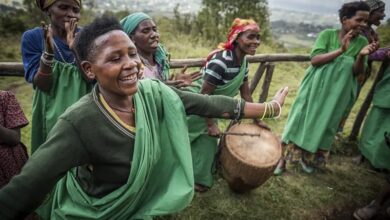Traditional African Sports that Survived Colonialism

Africa’s vibrant cultural history is rich with traditional sports that have stood the test of time, surviving colonialism and continuing to thrive across the continent.
While contemporary sports like soccer and basketball are hugely popular today, pre-colonial Africa had its thrilling games and competitions, often rooted in community values, honour, and survival.
Let’s explore nine traditional African sports that, despite the influences of colonialism, have endured and are still practised today.
1. Aboakyer Festival – Ghana’s Deer-Hunting Tradition
Hunting, a skill essential for survival in ancient times, evolved into a culturally significant event in many African societies.
In Ghana, the Aboakyer Festival, celebrated by the Effutu people of Winneba, is an annual deer-hunting event held on the first Saturday of May.
Originating as a spiritual ceremony to honour the god Penkye Otu, the festival now sees young men compete to capture a live, uninjured deer, symbolizing bravery and teamwork. The first group to return with a deer is honoured, and the animal is sacrificed as a tribute to their god.
Reference Link: BBC on Aboakyer Festival
2. Traditional Wrestling – The Bragging Rights Sport of West Africa
Wrestling was an esteemed sport in pre-colonial African societies, especially among the Igbo of Nigeria, who saw it as a mark of strength and resilience.

Young men competed for titles and social status, showcasing their physical prowess. Today, West African wrestlers from Senegal, Ghana, and Nigeria continue to honour this legacy in annual tournaments.
Also Read: Safari Holiday in Africa: Top 10 Destinations in Africa For a Safari Holiday
Wrestling for women is also popular, notably in Senegal’s Women’s Bakweri wrestling.
Reference Link: National Geographic on West African Wrestling
3. Nguni Stick Fighting – The Martial Art of Southern Africa
Nguni Stick Fighting, a favourite pastime of South African herdsmen, involves two opponents armed with sticks. Known for its intensity, this sport emphasizes skill, precision, and respect between competitors.
Though banned in many regions for its potential risks, it remains a treasured rural tradition, where players train extensively and aim to outmanoeuvre rather than injure their opponents.
Reference Link: South African History on Nguni Stick Fighting
4. Donkey Racing – Kenya’s Thrilling Coastal Sport
In the coastal town of Lamu, Kenya, donkey racing is a celebrated tradition. Jockeys ride well-trained donkeys without saddles, a feat requiring both skill and agility.
This sport, deeply woven into Lamu’s cultural fabric, sees fierce competition, often during festivals, and has entertained spectators for centuries.
5. Kgati – South Africa’s Traditional Skipping Game
Known as Kgati, Ntimo, or Ugqaphu, this South African sport combines skipping and song. Two players hold a long rope while a third person skips to the rhythm of traditional chants.
Celebrated for its intricate footwork, Kgati was recognized globally when the South African team won gold at the World Sport for All Games in 2012.
6. Camel Racing – A Historic Sport of North Africa
Camel racing, with roots as old as the 7th century, is a historic sport widely practised in North Africa and the Arabian Peninsula.
Riders race dromedaries, a single-humped species known for their endurance, over long courses. Today, camel racing remains a prestigious event, symbolizing both heritage and skill.
7. Capoeira – Angola’s Rhythmic Martial Art
Capoeira, often associated with Brazil, traces its origins back to Angola, where it was known as N’golo. This martial art combines dance, music, and acrobatics in a ritualistic performance that connects participants with their ancestors.
It uses techniques like evasion, jumping, and kickboxing and was later adapted by enslaved Africans in Brazil, where it became both a sport and a form of resistance.
8. Boat Racing – Africa’s Coastal Sporting Tradition
For Africa’s coastal communities, boats were essential not only for fishing but also for competition. Boat races were common among coastal tribes, where fishermen would challenge each other for fun or reward.
The sport has evolved into a popular tradition, with races often held during local festivals, celebrating the skill and unity of the participating crews.
9. Jukskei – An Afrikaner Game with African Roots
Jukskei, originating in South Africa’s Cape region, involves knocking over an upright stick with a wooden peg, originally part of an ox yoke.
his game, long associated with Afrikaner traditions, requires precision and strategy, making it a beloved sport, particularly in South Africa, where it is still played today.
Conclusion
The persistence of these sports across Africa is a testament to the continent’s rich cultural resilience. These traditional games connect modern Africans to their ancestral heritage, fostering a sense of pride and continuity.
As more people become aware of these unique practices, the world gains a deeper appreciation for Africa’s diverse sporting history.
Further Reading





